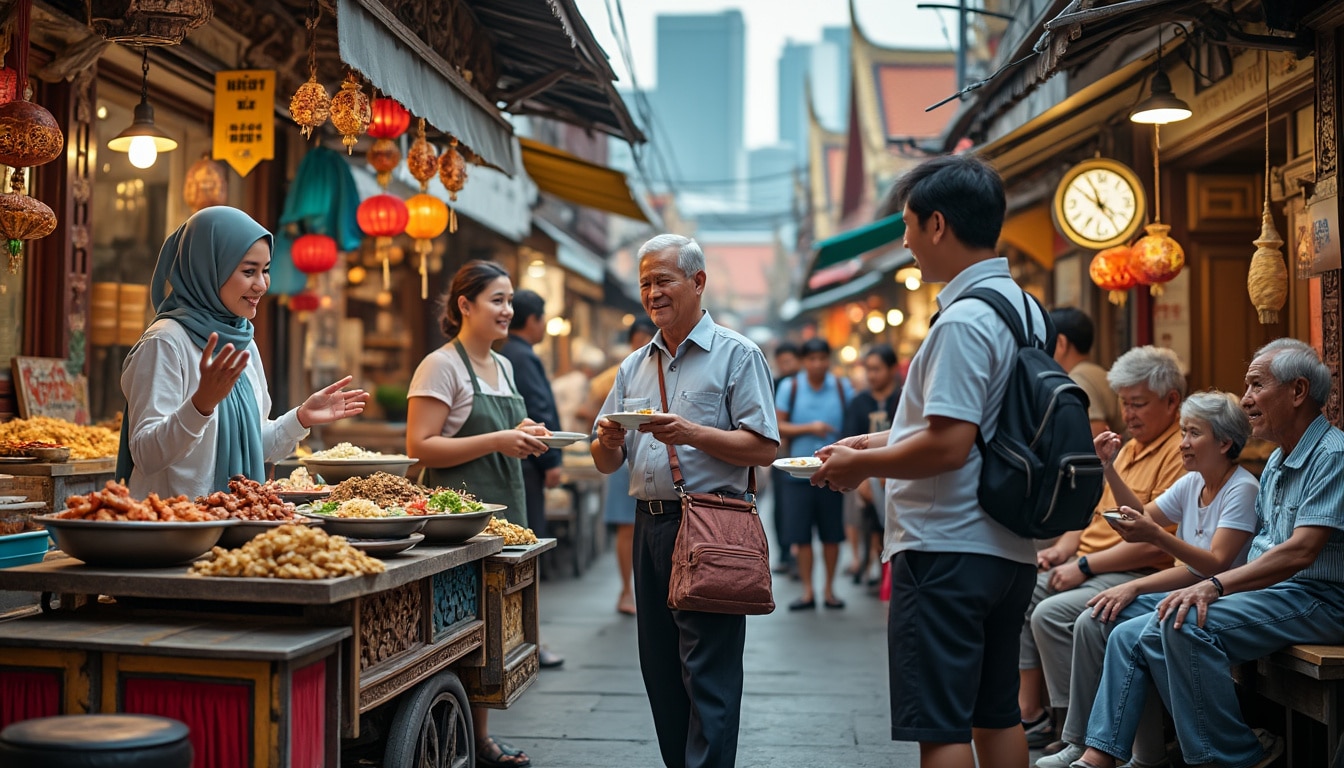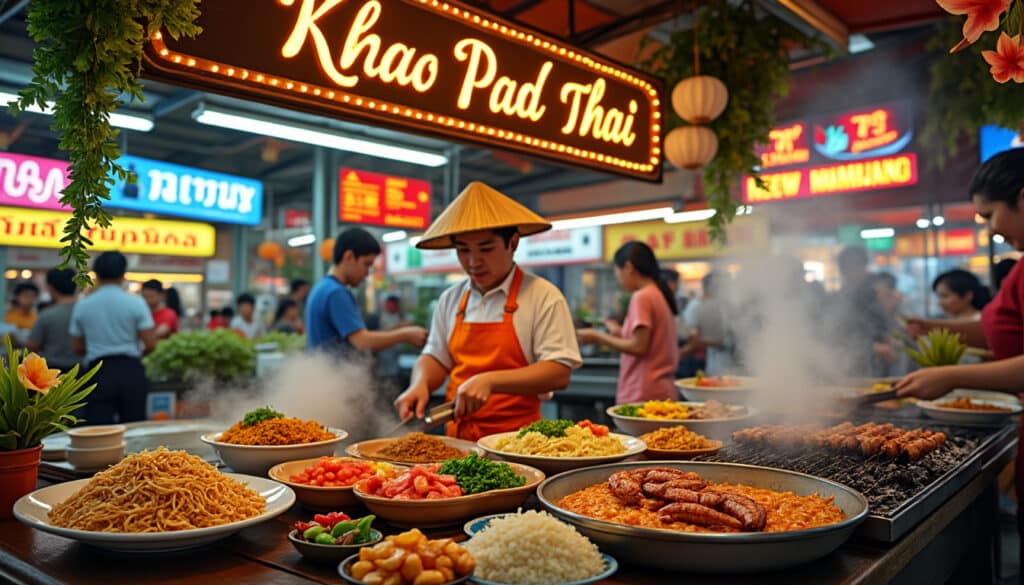Bangkok is a bustling, populous city where many communities come together, creating a fascinating linguistic landscape. As you navigate through the vibrant streets, you will hear a symphony of languages that includes Thai, English, Chinese, and various regional dialects. This melting pot of languages mirrors Bangkok’s rich history, diverse population, and its status as a major international hub. Whether you’re a tourist or a local, understanding the linguistic tapestry of Bangkok can enrich your experience, allowing you to connect more deeply with its people and culture.
Thai: The Heart of Bangkok’s Linguistic Tapestry
The primary language spoken in Bangkok is Thai, and it plays a critical role in the city’s identity and culture. Thai is a tonal language with five primary tones, presenting a unique challenge for non-native speakers. Its script, the intricate and beautiful Thai alphabet, adds another layer of complexity but also contributes to its charm.
Understanding the Thai language can significantly enhance your trip to Bangkok. Not only will it allow you to navigate more easily, but it will also open doors to deeper interactions with locals. Even learning just a few basic phrases can make a big difference — “Sawasdee” for “Hello,” “Khop Khun” for “Thank you,” and “Aroi” for “Delicious” are all practical phrases to know.
In Bangkok, you’ll primarily hear Central Thai, the most widely spoken dialect. It’s the language of government, education, and media, making it essential for those living and working in the city. Despite its challenges, numerous resources are available for learning Thai, such as Rosetta Stone and Duolingo, making it accessible for those interested in immersing themselves more deeply into the culture.
Bangkok’s multilingual nature is also reflected in signs, menus, and directions, which are frequently displayed in both Thai and English, particularly in tourist hubs. This dual-language signage is instrumental in helping tourists navigate the city and gain insights into its cultural nuances.
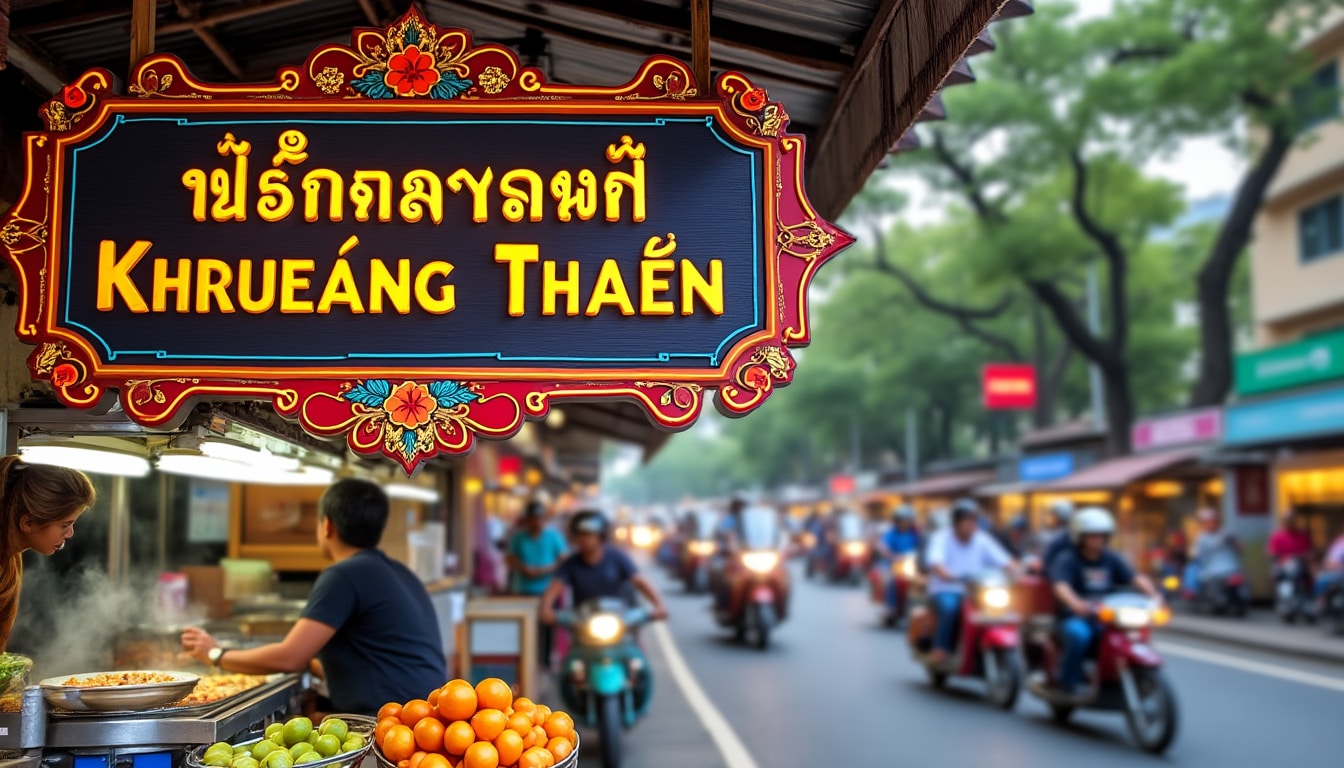
The Tonal Beauty: Challenges and Rewards of Learning Thai
Thai’s tonal nature means that the meaning of a word can change entirely based on its tone — high, mid, low, rising, or falling. This characteristic can be both challenging and rewarding for learners. Apps like Memrise and Busuu are popular choices for tackling this aspect of the language. They provide interactive exercises to help you master the tones and pronunciation, crucial for meaningful communication.
Despite the complexities, learning Thai can offer a rich reward — a more profound connection to Bangkok’s people and culture. Those who embrace the challenge often find themselves warmly welcomed by locals, who appreciate the effort to learn their language and customs. In a way, tackling the tonal challenges is a gateway to an authentic Bangkok experience, allowing travelers to uncover the city’s hidden gems and lesser-known stories.
- 🌟 Learn basic Thai greetings.
- 📚 Utilize language learning apps like Babbel and Lingoda.
- 🎵 Practice listening to Thai music for tonal awareness.
- 🎓 Take a structured class with platforms like italki or FluentU.
English: The Global Language of Commerce in Bangkok
English holds a significant place in Bangkok, particularly in its tourism and business sectors. With Bangkok being a global tourist destination, English serves as a vital bridge for communication. This is especially true in areas thronged by tourists, such as the Grand Palace, Wat Pho, and major shopping districts.
The proficiency in English within Bangkok has been rising steadily, especially among the younger generations who have been exposed to English education from a young age. This trend is bolstered by the city’s hospitality industry, where English proficiency is essential, from hotel staff to restaurant servers, as they cater to international guests.
| Location | English Proficiency Level | Notes |
|---|---|---|
| Tourist Areas | High | English widely spoken in shops and attractions 🤝 |
| Hotels | Very High | Staff trained in English for guest assistance 🛎️ |
| Public Transport | Moderate | English signage available 🚌 |
| Local Neighborhoods | Low to Moderate | Less frequent, basic phrases helpful 🙋♂️ |
Despite the high levels of proficiency in key areas, travelers may still find English less commonly spoken in local neighborhoods and markets. Here, a few Thai phrases or a handy translation app can improve your interactions significantly and make your experience more enjoyable. Resources such as Pimsleur can provide valuable practice for both Thai and English pronunciation as you prepare for your trip.
Engaging with English: Practical Tips for Tourists
Enhancing your English skills before visiting Bangkok can be beneficial, especially if your travels extend beyond traditional tourist spots. For those wishing to polish their English or engage in language exchange, online platforms like italki offer opportunities to converse with native English speakers or even local Thais looking to practice their English skills.
When traveling, remember that a polite demeanor and a smile go a long way in Bangkok. Leveraging both English and Thai can ease navigation through the city, facilitate more engaging interactions, and, perhaps most importantly, demonstrate respect for the local culture and its intricacies.
Beyond Thai and English: A Rich Linguistic Mosaic
Bangkok is not only a city where Thai and English dominate but also a vibrant mosaic of other languages. Due to its cosmopolitan nature, the city hosts a variety of languages brought in by expatriates and visitors from around the globe. Chinese, especially Teochew, is particularly notable, representing Bangkok’s significant Chinese community.
Here’s a breakdown of some of the other languages you might hear as you explore Bangkok:
- 🀄 Chinese: Primarily Teochew, but also Mandarin and Cantonese.
- 🇲🇲 Burmese: Spoken by the Myanmar community.
- 🇯🇵 Japanese: Present due to expatriate communities and corporate offices.
- 🇻🇳 Vietnamese: Reflects the Vietnamese presence in Bangkok.
- 🇲🇾 Malay: Spoken in certain neighborhoods and by traders.
These languages reflect Bangkok’s welcoming nature and its role as a central hub of Southeast Asia. Education and cultural exchange programs further bolster this linguistic diversity, with many international schools and language institutes offering courses in these various languages.
This rich tapestry of languages doesn’t just make Bangkok an exciting place to visit — it makes it a hub for cultural exchange and learning. Language apps like FluentU can help you engage with these communities by offering creative ways to learn Chinese or other languages through movie clips, TV shows, and songs.
Navigating Bangkok’s Linguistic Diversity
While navigating this rich linguistic landscape, patience and curiosity will serve you well. Whether you’re learning a new phrase in Chinese to impress your hotel staff or picking up a few words of Japanese for a business meeting, Bangkok offers countless opportunities for linguistic enrichment. These interactions often lead to richer, more meaningful experiences that transcend typical tourist activities.
Language Learning in Bangkok: Opportunities and Resources
Bangkok offers numerous opportunities for learning both Thai and other languages, thanks to its plethora of language schools and online platforms. Whether you’re a beginner aiming to grasp the basics or someone looking to enhance your proficiency, Bangkok presents valuable resources and environments to foster these ambitions.
Here are some popular language learning tools and opportunities available in Bangkok:
- 🎓 Language Schools: Renowned institutions and local classes are available for comprehensive language courses.
- 📱 Language Apps: Tools like Rosetta Stone, Mango Languages, and Duolingo offer convenient ways to practice and learn on the go.
- 💼 Online Courses: Platforms such as Babbel and Lingoda provide structured lessons that can complement your learning journey.
- 🗣️ Language Exchange: Engaging with locals through apps like italki can improve conversational skills.
For those committed to mastering Thai, online resources such as videos, tutorials, and apps are plentiful. Additionally, various cultural events and local meetups are often centered around language exchange, providing a supportive community for practice and interaction.
Thus, whether you choose a structured school environment, prefer the flexibility of apps, or thrive in social learning settings, Bangkok provides ample avenues to nurture your language ambitions.
| Resource | Focus Language | Features |
|---|---|---|
| Mango Languages | Multiple languages | Fun, interactive lessons 🎲 |
| Rosetta Stone | Thai, English, Others | Immersive method 🌍 |
| Duolingo | Thai, English, Others | Game-like learning experience 🎮 |
| Babbel | Multiple languages | Conversational focus 💬 |
Embarking on a Language Adventure
Embracing language learning in Bangkok can be more than just a way to communicate; it becomes a journey into the heart of Thai culture and a bridge to other global communities residing in the city. Engaging in cultural storytelling through language can enrich your stay and foster lifelong connections with the people you meet.
🗺️ With determination and the plethora of resources at hand, your linguistic adventure in Bangkok awaits. Dive in and discover the many layers of language that make this city truly unforgettable. Happy language exploring!
Frequently Asked Questions
Is English widely spoken in Bangkok?
Yes, English is widely spoken, especially in tourist areas, hotels, and businesses. However, the level of fluency can vary, so knowing basic Thai phrases can be helpful.
What is the most common language in Bangkok?
Thai is the most common language in Bangkok, with the Central Thai dialect being the most prevalent.
Can I learn Thai easily?
Thai has a unique script and is a tonal language, which can be challenging. However, with dedication and resources like apps and courses, learning the basics is achievable.
Are there language schools in Bangkok?
Yes, there are numerous language schools offering Thai and other language courses to help learners at various levels.
How can I practice languages while in Bangkok?
Engaging with locals, using language exchange apps, and attending cultural events are great ways to practice languages in Bangkok.

Culture & Local Life in Bangkok
Bangkok is an intoxicating blend of ancient traditions and modern life, a city where the past meets the present seamlessly. Whether wandering through the narrow alleys of Chinatown, exploring the grandeur of the Grand Palace, or tasting the rich flavors…
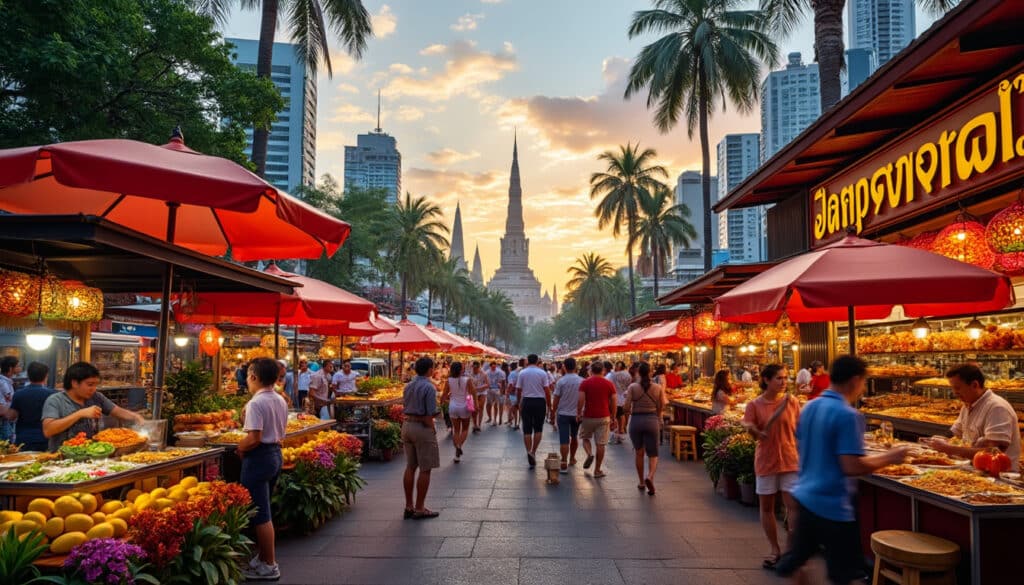
Bangkok, the vibrant capital of Thailand, is not only known for its bustling streets and stunning temples but also for its mouthwatering food scene. From the sizzling woks of street vendors to the sophisticated dining experiences at Michelin-starred restaurants, the…
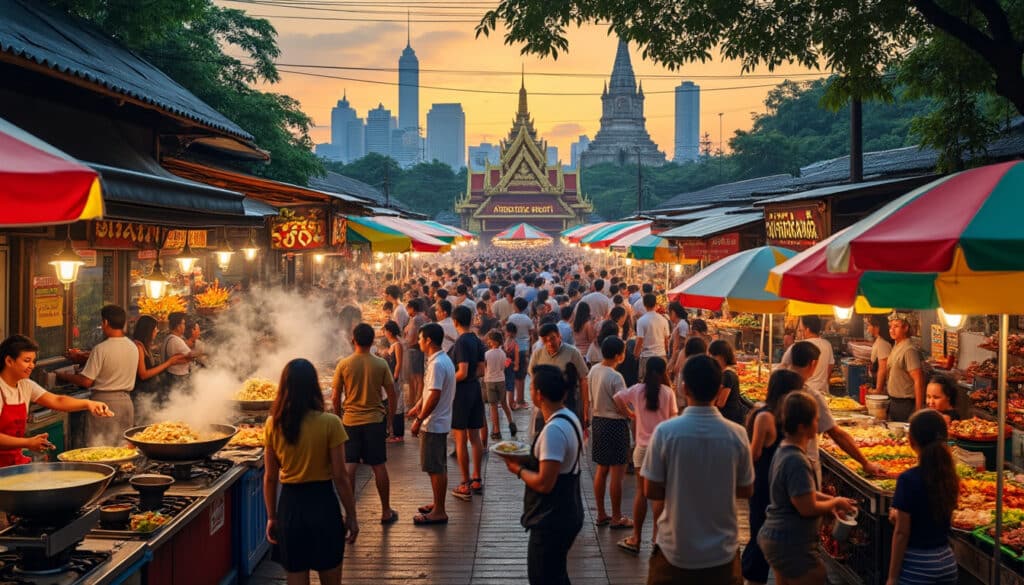
In a city where culinary delights are as rich and diverse as its culture, understanding meal times in Bangkok is crucial to fully embrace its vibrant food scene. From the dawn of morning until the wee hours of the night,…
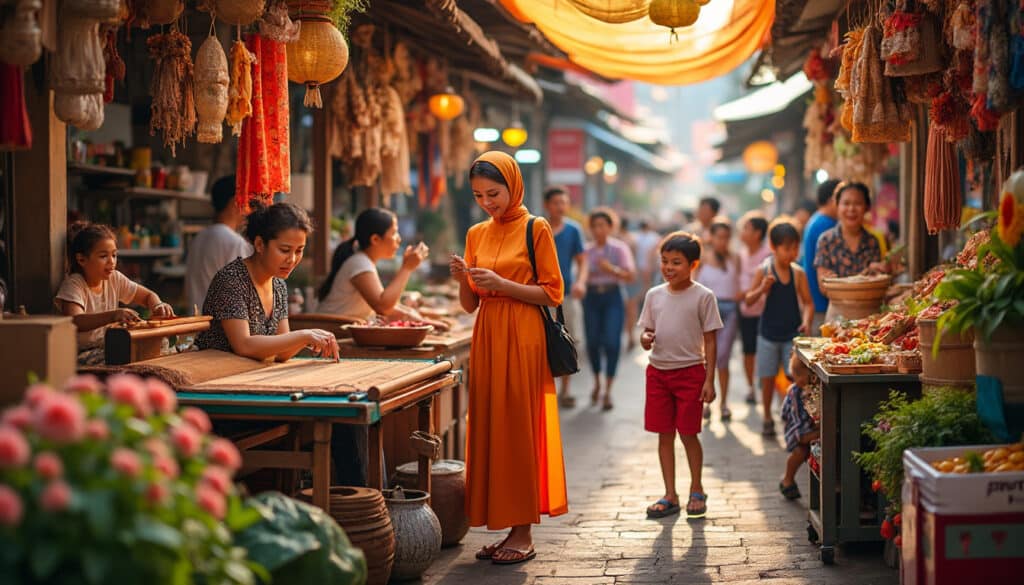
Souvenirs and shopping in Bangkok
Bangkok, a dynamic city teeming with life, is not only the capital of Thailand but also a shopping paradise. This vibrant metropolis offers an eclectic mix of traditional and contemporary shopping experiences. From bustling markets that pulse with local flavor…
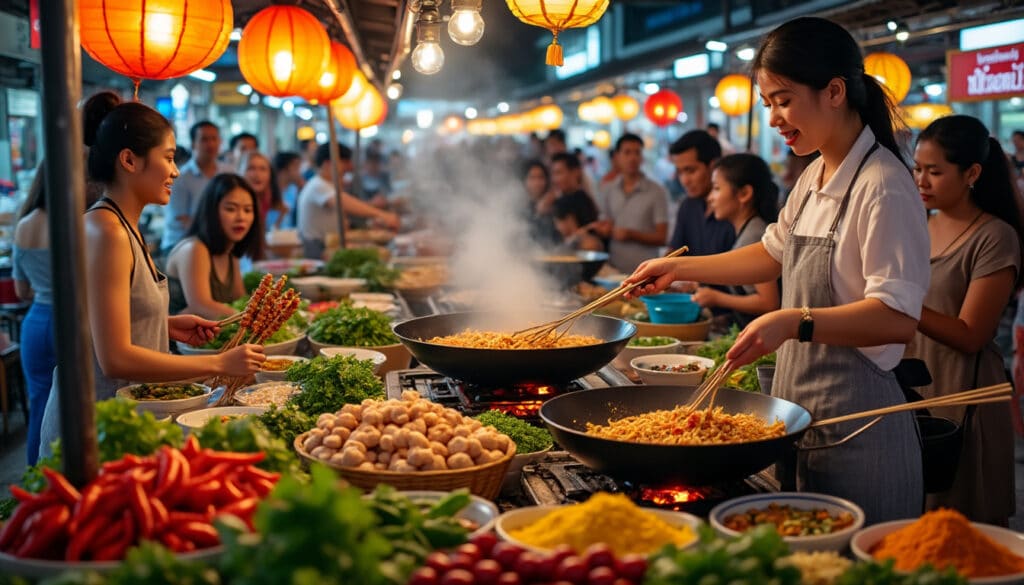
What do people eat in Bangkok?
Bangkok, with its bustling streets and vibrant atmosphere, is a treasure trove for food lovers. Known for its diverse flavors and delightful street food experiences, the city offers a taste of traditional Thai dishes along with innovative culinary surprises. From…

